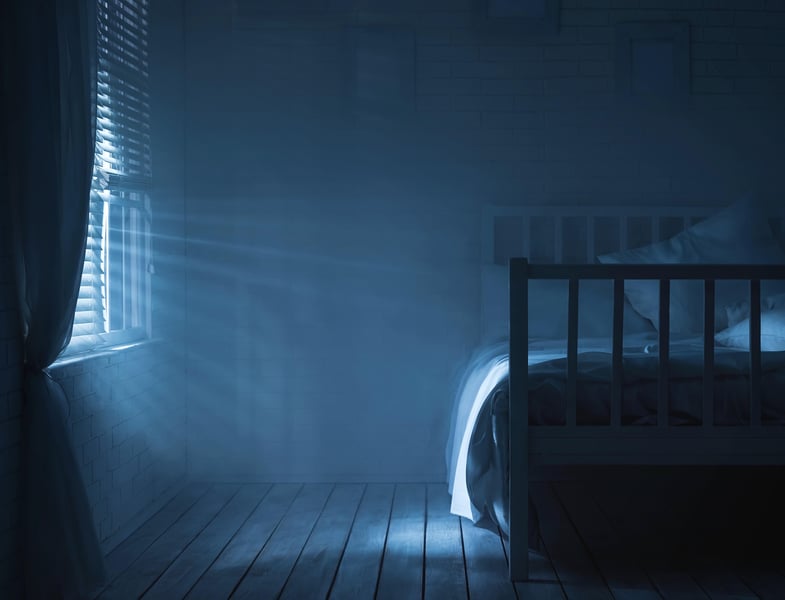Manténgase sano!

- Steven Reinberg
- Posted June 22, 2022
Light in Your Bedroom Is No Good for Your Health
Keeping your bedroom dark not only helps you get a good night's sleep, but may significantly lower your odds of developing three major health problems, a new study suggests.
Older men and women who used night lights, or left their TV, smartphone or tablet on in the room were more likely to be obese, and have high blood pressure and diabetes, compared with adults who were not exposed to any light during the night.
"Maybe even a small amount of light at night is not so benign, it can be harmful," said lead author Dr. Minjee Kim, an assistant professor of neurology at Northwestern University Feinberg School of Medicine's Center for Circadian and Sleep Medicine in Chicago.
She cautioned, however, that the new study doesn't prove that exposure to light during sleep causes any of these health conditions, only that there may be a link.
And, Kim said, there may be a biological explanation beyond disrupted sleep that ties light to an increased risk for obesity, diabetes and high blood pressure.
"It's not natural to see those lights at night," Kim said. "Light actually turns off some of the parts in the brain that tell our body it's the daytime versus nighttime. So those signals are messed up in a way, because the circadian signal is weakened, and over time, that has implications for our health."
So, she said, over time light may cause metabolic and heart diseases.
Kim and her colleagues looked at more than 550 participants in the Chicago Healthy Aging Study. The 63- to 84-year-olds wore devices that measured the amount of light in their bedrooms over a week.
Fewer than half had five hours in complete darkness as they slept, the study found. The others were exposed to some light even during the darkest five hours of the day -- usually in the middle of their sleep at night.
The researchers said they didn't know if obesity, diabetes and high blood pressure prompt people to sleep with a light on or if the light led to development of the conditions. But, they added, some people with foot numbness due to diabetes may want to use a night light to help prevent falls when they have to use the bathroom at night.
Emerson Wickwire, professor and section head of sleep medicine at the University of Maryland School of Medicine, was not part of the study, but reviewed the findings. He said the results add to a growing body of scientific evidence showing the importance of the body's circadian clock and sleep to overall health, particularly among older adults.
"What these data show is that exposure to light at nighttime increases risks for two of the most common and costly chronic medical conditions in the U.S. and worldwide -- obesity and diabetes -- as well as hypertension, a major cardiovascular risk factor," Wickwire said. "Even though this study warrants careful follow-up in future studies, these are exciting findings."
Several factors may account for the worsening health effects of overnight exposure to light, Wickwire said.
"First, light at night could worsen health by dysregulating the circadian clock," he said. "In addition to sleep, circadian health is vital for the prevention of disease and optimal performance."
Second, Wickwire noted, light is a powerful melatonin suppressant.
"Melatonin, also called the darkness hormone, is associated with multiple health properties, including anti-inflammatory and antioxidant properties. Light at night reduces melatonin," Wickwire said.
In addition to increasing physiologic stress, he said, light at night can also be a marker for overall poor health, as people awake at night may be engaged in other risky behaviors.
To get all the benefits sleep provides, Wickwire has this advice: "Create a sacred space for sleep," he said. "Your bedroom environment should be cool, dark, quiet and uncluttered."
Kim's team also has tips about keeping bedroom light to a minimum:
- Don't turn lights on. If you need to have a light on for safety, make it a dim one that's close to the floor.
- The color of the light is important. Amber or red/orange light is less stimulating to the brain. Don't use white or blue light, and keep it far away from the bed.
- If you can't control outdoor light, use blackout shades or wear an eye mask.
- Place your bed so outdoor light doesn't shine in your face.
The findings were published June 22 in the journal Sleep.
More information
For more on getting a good night's sleep, see the U.S. National Institute on Aging.
SOURCES: Minjee Kim, MD, assistant professor, neurology, Center for Circadian and Sleep Medicine, Northwestern University Feinberg School of Medicine, Chicago; Emerson Wickwire, PhD, professor and section head, sleep medicine, University of Maryland School of Medicine, Baltimore; Sleep, June 22, 2022
